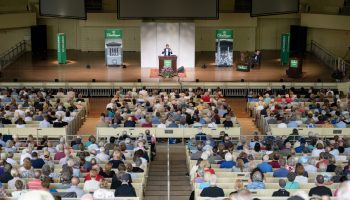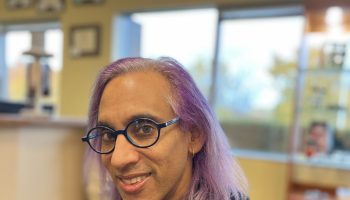Hours after publishing magnate and editor-in-chief of Forbes magazine Steve Forbes called for freer markets and greater economic growth to solve the world’s ills, David Korten offered not only a point-by-point rebuke of Forbes’ policy arguments, but also a condemnation of the individualistic and capitalistic philosophy from which Forbes’ prescriptions arise.
Speaking from the Interfaith Lecture platform at the Hall of Philosophy Wednesday afternoon, Korten delivered an indictment of global capitalism, international development and the cultural and spiritual stories he said underpin the economic system rapidly destroying the planet. A graduate of Harvard Business School who spent 21 years travelling the globe for the Ford Foundation and other development organizations before growing disillusioned with the system, Korten called for a new narrative that views every living thing as part of the breath of God.
He said that philosophy could form the foundation for a new global system in which humans work with each other and the Earth to ensure every person gets a living wage within the confines of what the Earth can sustain.
“I came to appreciate how … the stories that we live by influence how we see the world, and how differently we can organize our lives depending on the stories that we organize around,” Korten said. “If you think about [it], this is one of the extraordinary things about being human: we choose our future, we choose the way we live by the stories we have in common.”
Although Chautauqua Institution is good and important, Korten said, it is a bubble populated largely by what he called “the most privileged generation in history” — the white children of the 1930s and early 1940s who could grow up knowing they would be able to get a job and then were able to save and invest for a relatively comfortable retirement.
Their wealth, however, is a product of the same capitalism that wreaked and is wreaking havoc on much of the world’s indigenous populations, people of color and the Earth itself, Korten said. He said humans now consume 1.6 times the Earth’s capacity of resources. He brought the oft-cited statistic that 62 billionaires now control as much wealth as half the world’s population; almost by definition, as wealth consolidates, there is less money and less opportunity for the rest of the world.
“This leaves us with a particular obligation. … We need to be mindful how different our experiences have been [from those of] today’s youth and of course to people who come from a different skin color,” Korten said. “There are very few of us who live in this bubble. The greater picture is a world being pushed into greater and greater inequality and further destruction of Earth’s capacity to support life.”
Americans often try to make a difference by joining the Peace Corps or supporting other global development operations, as Korten did for 21 years, but Korten said those operations rely on the same stories that have already produced such rampant inequality and environmental destruction.
The problem is that the global market economy is broken and oppressive, Korten said. In the days of Adam Smith, markets just meant local and harmonious trade in the square. The modern world market is dominated by global corporations with allegiance to no state or entity, only profit. Laws don’t block competition or social mobility, Korten said, but monopolistic corporations do.
“All this suggests that the last thing we need is more economic growth and more freedom for corporations to further concentrate their monopoly on wealth,” Ford said.
Expanding that global economy, Korten said, particularly through supposedly altruistic economic development, only enhances the power of those corporations. Well-intentioned foreign aid workers push people off their land and out of their communities into sweatshops and wageless agricultural labor. The result is continued destruction of the environment, and most importantly, making the native people fully dependent on money.
“If you can create a society where everyone is dependent on money for every aspect of their life, and you control the creation and allocation of money, you absolutely control every human being in that society,” Korten said. “What we were putting in place in the name of development was really a reinstitutionalization of colonialism.”
The only difference is that now it’s global corporations rather than states controlling indigenous people, Korten said.
Small reforms are insufficient, he said. Korten, who studied Marxist revolutions in college, called for a new global narrative that no longer views humans as naturally individualistic people who should pursue self-interest and the world as property to be exploited.
Korten said there were three stories the Western world tells to make sense of the world. First is an image of God as all-powerful. If everything is done by His will, it can lead to a belief that the rich and powerful should be rich and powerful and that this world is just a way-station to the next.
“I heard a woman on talk radio saying she thinks of life here as nothing more than a short stayover cheap hotel,” Korten said. “Well, when you think of life as cheap hotel, then you’re not really thinking of your neighbors or making sure the rooms are in good repair. You’re just looking to getting on and getting out.”
Second, he said, is a secular view of life as being purely random and the product of the laws of physics dating back to the Big Bang. That, Korten said, can lead to a view of life as meaningless and allows people to see competition as their purpose.
Third, Korten said, is a view of the world as part of a single spirit, with the purpose of life to transcend the illusion of difference into a single oneness. Korten said that falls short because it does not answer what the purpose of the current reality is.
“These three stories lead to money and market world,” Korten said. “Money is wealth, consumption is happiness, GDP is best indicator of economic performance; GDP growth benefits everyone. [It’s] the sacred money and market story by which the whole economy operates.”
Drawing from the Bible, Korten said humans can worship either life or money but not both. He told Chautauquans to choose life. View the world not from a capitalist lens in which each person is an individual actor, he said. Rather, look at every living thing as full of God’s breath and each human as a cell in body, each dependent on the others for continued the survival and each working for the survival of the whole.
“That is the challenge before us,” Korten said. “It requires that we reorganize around community, organize around place but with awareness that we are now a global species. We must be as aware of concern for our neighbor as we are for ourselves.”
(Photo by Carolyn Brown.)






